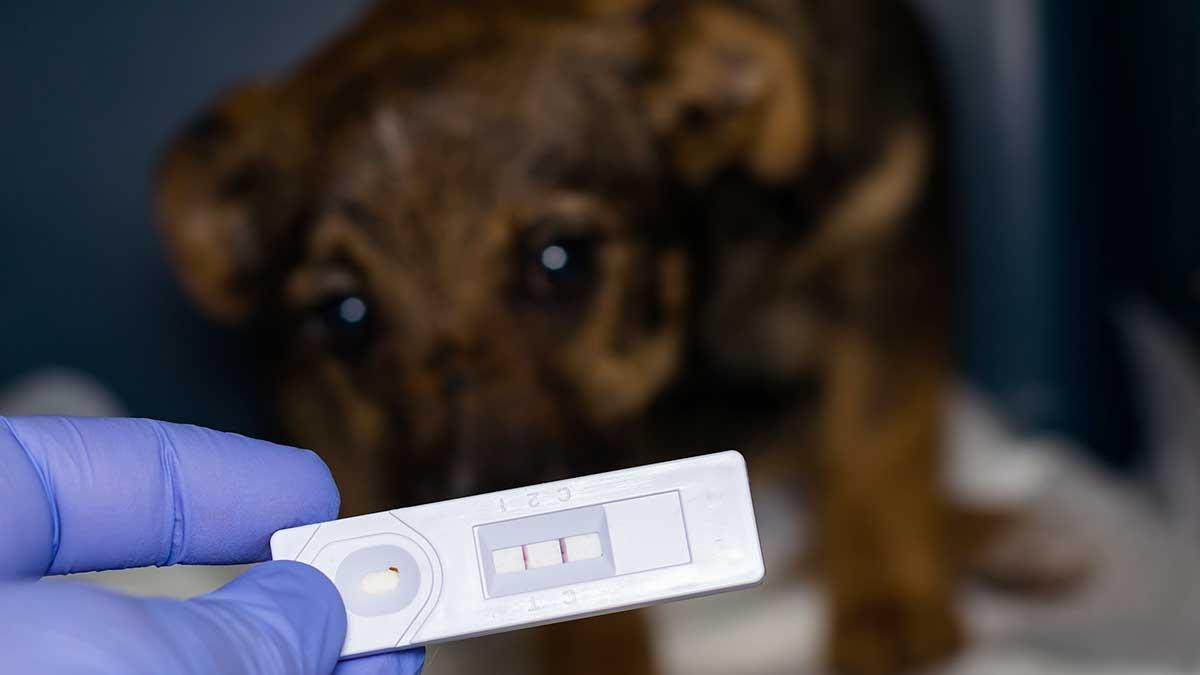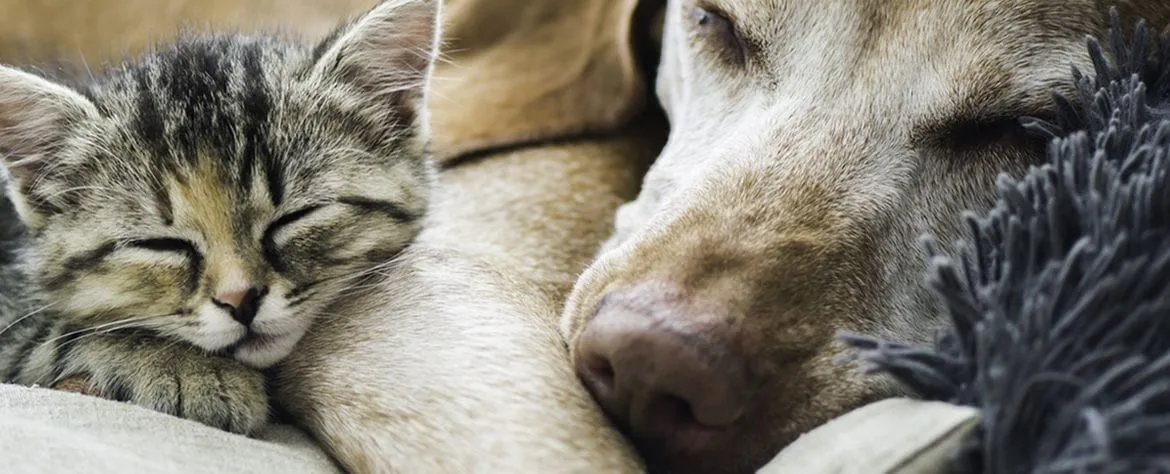
Canine Parvovirus (CPV) is a highly contagious viral infection that affects dogs of all ages but is most commonly seen in puppies. The highly contagious virus can cause severe and potentially fatal illness, so it's essential for dog owners to be aware of the symptoms and treatment options.
CPV is a virus that shares a strong connection with the feline panleukopenia virus (FPV), which has been documented since the 1920s for infecting cats, minks, and other animals. So be sure to take all your furry friends to the veterinarian.
Let's discuss the symptoms of canine parvovirus in dogs, how it's transmitted, and the management options available.
Symptoms of Parvovirus in Dogs
The symptoms of CPV in dogs can vary from mild to severe and can develop quickly. In puppies, the most common symptoms include vomiting, diarrhea, lethargy, and loss of appetite. These symptoms can be particularly severe in young puppies, as the disease attacks rapidly dividing cells, including those in the intestinal lining.
Parvovirus attacks rapidly dividing cells, including those in the bone marrow, leading to decreased production of red and white blood cells and platelets. This can result in severe symptoms such as a weakened immune system.
Other symptoms of canine parvovirus in dogs can include fever, dehydration, and weight loss. In a more severe case of CPV, the virus affects the heart muscles, leading to a condition called myocarditis, which can be fatal.
Our top priority at Phoenix Veterinary Center LINK is the health and well-being of your beloved pets. We are a full-service animal hospital in Phoenix that specializes in caring for cats and dogs. We take great pride in our progressive medical and surgical approach and our exceptional level of client service.
Parvo Symptoms in Puppies and Dogs
Clinical signs of CPV in dogs include:
- Refusal to eat
- Drooling
- Vomiting
- Diarrhea or severe diarrhea - sometimes blood appears in the stool
- Dehydration
- Weakness and difficulty walking
- Lack of coordination
- Depression
- Fever
How is Parvovirus Transmitted?
Canine parvovirus is highly contagious and can be transmitted through contact with infected feces or vomit. The virus can survive in the environment for up to six months, making it particularly challenging to eradicate.
Puppies and unvaccinated dogs are at the highest risk of contracting CPV, as their immune systems are not fully developed. However, even a fully vaccinated puppy can still contract the virus, particularly if they are exposed to a particularly virulent strain.
Prevention is vital when it comes to CPV, and the most effective way to protect your puppy is through immunizations. Puppies should receive a series of vaccinations, starting at six to eight weeks of age and continuing every three to four weeks until they are 16 weeks old.
Adult doggos should also receive regular booster vaccinations to maintain their immunity to parvovirus. In addition to immunizations, practicing good hygiene, such as picking up after your puppy and washing your hands after handling dogs or their waste, can also help prevent the spread of parvovirus.
Treatment for Parvovirus in Dogs
If your dog is exhibiting symptoms of parvovirus, it's essential to seek veterinary care immediately. The earlier the diagnosis and treatment, the better the chances of recovery.
Treatment for parvovirus in canines typically involves hospitalization and supportive care, including intravenous fluids to prevent dehydration, antibiotics to prevent secondary infections, and medication to control vomiting and diarrhea.
In severe cases, a puppy may require blood transfusions or other interventions to support organ function. Treatment can be lengthy and expensive, with hospitalization often lasting several days to a week or more.
In some cases, despite the best efforts of veterinary care, a puppy may not survive parvovirus. This is particularly true in cases where the infection is severe or if the dog's immune system is compromised by other factors.
Parvovirus primarily affects the gastrointestinal tract of dogs, but it can also affect other organs, including the bone marrow. When parvovirus infects the bone marrow, it can lead to decreased production of red and white blood cells and platelets, which can have serious consequences for the dog's overall health.
If a dog with parvo has bone marrow involvement, veterinary treatment focuses on supportive care to manage the symptoms and improve the dog's immune system response. Here are some measures a vet may take:
Intravenous Fluid Therapy
Dogs with parvovirus often experience severe dehydration due to vomiting and diarrhea. Intravenous fluid therapy is administered to restore and maintain proper hydration levels.
Medications
Dogs with parvo may require medications to control vomiting, diarrhea, and secondary bacterial infections. Anti-nausea medications, antibiotics, and other supportive medications may be prescribed.
Nutritional Support
Dogs with parvo may have difficulty eating or keeping food down. Nutritional support, such as intravenous or subcutaneous fluids, and a special diet may be provided to ensure the dog receives essential nutrients.
Blood Transfusions
In severe cases where the bone marrow is severely affected, blood transfusions may be necessary to replenish red blood cells, white blood cells, and platelets.
Isolation and Quarantine
Dogs with parvo are highly contagious to other dogs, so strict isolation and quarantine protocols are necessary to prevent the spread of the virus.
It's important to note that the treatment approach may vary based on the individual dog's condition, the severity of the bone marrow involvement, and the vet's clinical judgment. Early diagnosis, prompt veterinary care, and aggressive treatment can significantly improve the chances of recovery for dogs with parvo, even if the bone marrow is affected.
Preventing the Spread of Parvovirus
Preventing the spread of canine parvovirus is crucial for protecting your dog and other puppers in your community. Here are some steps you can take to help prevent the spread of the disease:
Vaccinate your dog
Vaccination is the most effective way to prevent parvovirus in dogs. Make sure your dog receives the recommended series of vaccinations as a puppy and regular booster shots throughout their life.
Practice good hygiene
Always pick up after your dog and dispose of waste properly. Wash your hands thoroughly after handling dogs or their waste.
Avoid contact with dogs with CPV
If you know of a dog with parvovirus, avoid contact with that dog and any items that may have come into contact with the disease.
Keep your dog away from high-risk areas
Canine parvovirus can survive in the environment for months, so it's important to keep your dog away from areas where infected dogs may have been, such as dog parks, kennels, and pet stores.
Quarantine infected dogs
If your dog is diagnosed with canine parvovirus, keep them isolated from other dogs until they have fully recovered and are no longer shedding the disease.
Disinfect your environment
CPV is resistant to many common disinfectants, so it's essential to use a specialized disinfectant that is effective against the disease. Clean and disinfect all surfaces and items that may have come into contact with infected dogs, including bedding, toys, food, and water bowls.
Parvovirus is a severe and potentially deadly infection that can affect dogs of all ages. The disease is highly contagious and can be challenging to eradicate from the environment, making prevention key.
Vaccination is the most effective way to protect your dog from CPV, but practicing good hygiene and avoiding contact with infected dogs are also crucial. If your dog shows any signs of canine parvovirus, seek veterinarian care immediately to increase the chances of a full recovery.
With proper prevention and treatment, most dogs can recover from canine parvovirus and go on to live happy and healthy lives. Stay informed, take precautions, and protect your furry friend from this dangerous disease.
Contact Phoenix Veterinary Center
Contact Phoenix Veterinary Center if you think your dog has canine parvovirus or they need their vaccinations. To request an appointment for your furry four-legged family member, call (602) 559-5500 today!



